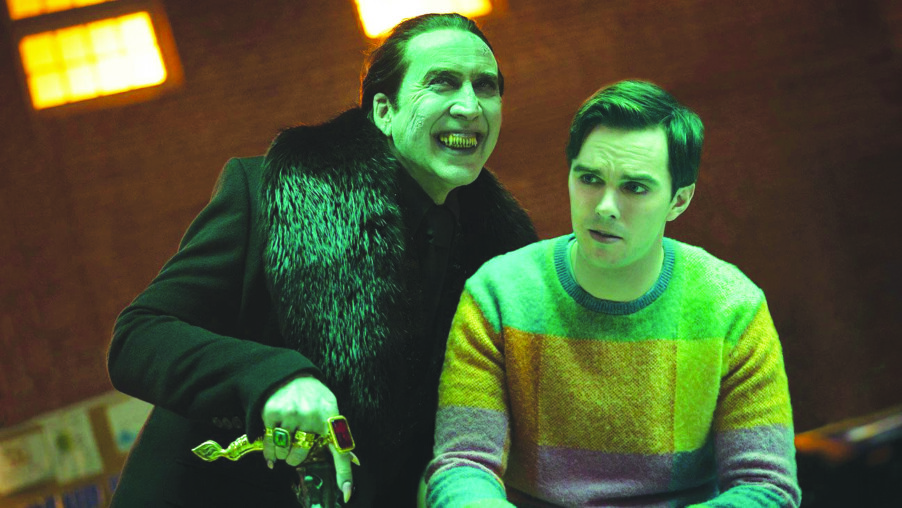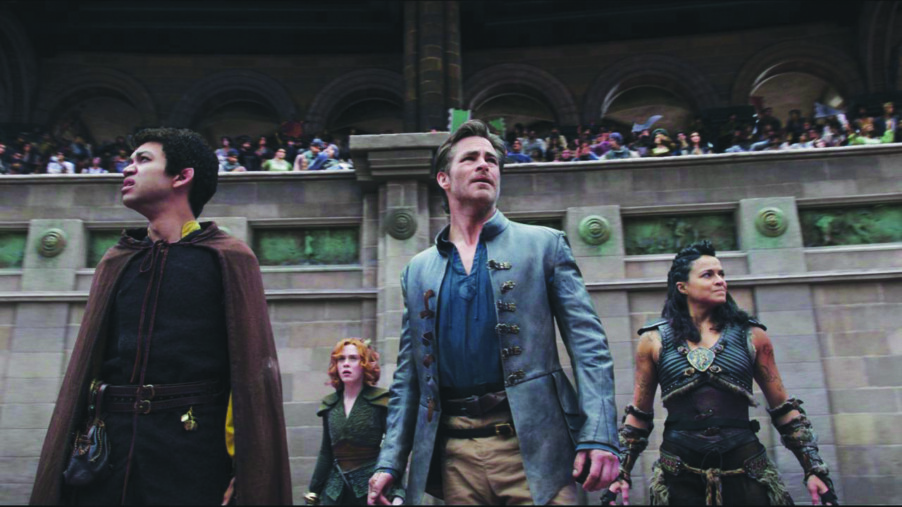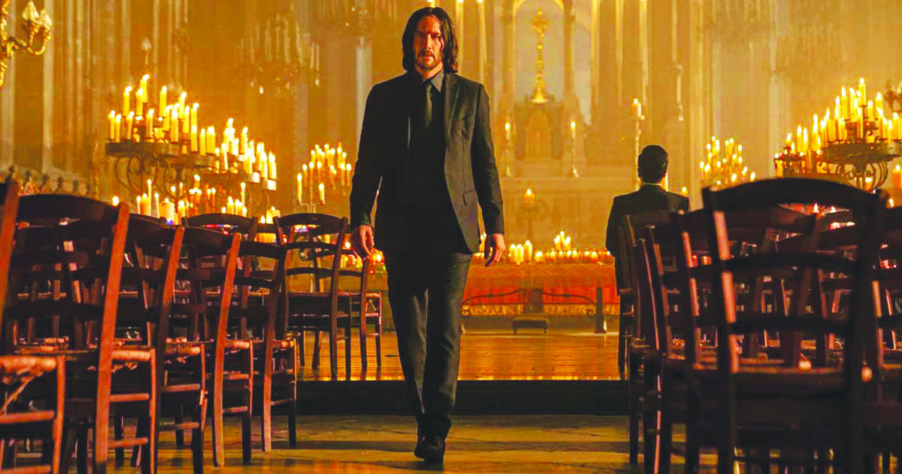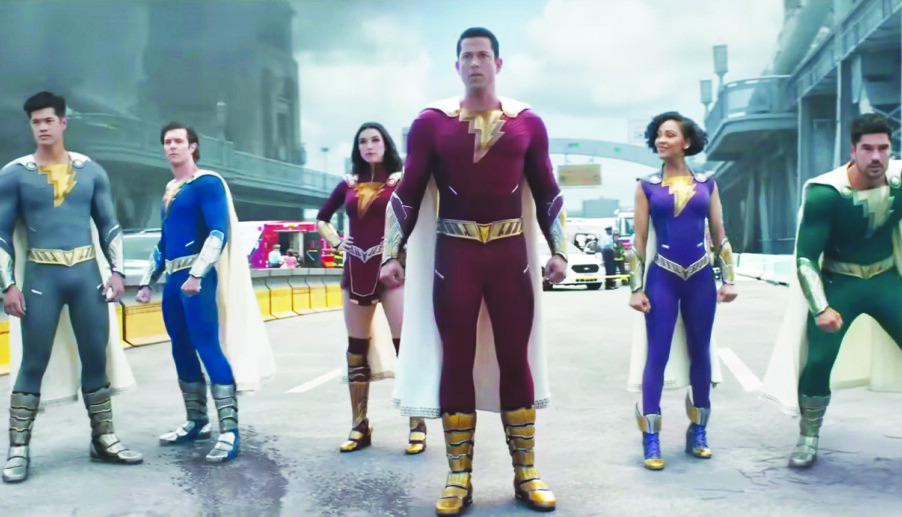Renfield (R)
Dracula’s familiar would like to reevaluate his toxic work situation in Renfield, a gore-filled and yet very cute comedy.
Renfield (Nicholas Hoult), he of the bug-eating and the “yes, master”-ing, is sick of working for Dracula (Nicolas Cage), a total diva of a boss who makes Renfield bring him people to eat. And, much in the manner of Miranda Priestly demanding very specific coffee from Starbucks, Dracula can be picky about the quality of the humans he’s offered. Dracula is also sort of low on funds after centuries of having to make getaways when his bloodlust is found out, so Renfield has to take care of an injured and slowly recovering Dracula in an abandoned hospital in New Orleans. And to procure these people for which he is shown little appreciation, he has to eat bugs, which give him a shot of Dracula strength.
Perhaps it’s good that Renfield has found a support group for people who are also in toxic relationships. He can listen to other people talk about how hard it is to stand up to the people who have power over them — and he can go find those bullies and drag them to Dracula, which makes Renfield feel like all his murder isn’t, you know, all bad.
But a complainy Dracula sends Renfield out to find a better group of people for his boss to eat — nuns or cheerleaders or something, Dracula says, with much the same energy of a louche aging rock star demanding a better class of groupies. Renfield heads to a club to do just that but ends up in the middle of a gangland hit. Tedward Lobo (Ben Schwartz — just 100 percent doing Jean-Ralphio from Parks and Recreation), son of Lobos gang head Bellafrancesca Lobo (Shohreh Aghdashloo), is there with a bunch of goons to kill Rebecca Quincy (Awkwafina), a police officer who is determined to bring down the Lobos (who killed her police officer father). Rebecca doesn’t blink when Tedward holds a gun to her head, instantly dazzling Renfield with her strength and bravery. Thusly he finds a bug to eat and helps her defeat the Lobos. Of course the Lobos don’t love this, so they go looking for Renfield just as Renfield starts to make a serious attempt to break away from Dracula, getting his own studio apartment and buying some pastel sweaters from Macy’s.
Renfield is good-naturedly silly — a good-naturedly silly movie where sometimes dudes get their arms torn off. It keeps the vampire lore to a minimum, goes easy on the quippiness (it’s there but it’s not wall to wall) and offers plenty of opportunities for Nicolas Cage to just take center stage and do his thing. And does he! He dives in with enthusiasm and fully commits to every increasingly hammy bit of Dracula-ness. I’ll bet those spiky teeth he has to wear were unpleasant to have in his mouth but he really does make every moment count with his open-mouth hisses and big vampire smiles. Everything about him, from the increasingly slicked back hair to his specific style of imperious whining, is just note-perfect. B-
Rated R for bloody violence, some gore, language throughout and some drug use, according to the MPA on filmratings.com. Directed by Chris McKay with a screenplay by Ryan Ridley, Renfield is a brisk hour and 33 minutes long and distributed by Universal Studios.
The Pope’s Exorcist (R)
Russell Crowe eagerly tucks into the plate of spicy meat-ah-balls that is his Italian accent in The Pope’s Exorcist, which is based on the real life of the Rev. Gabriele Amorth — have fun with that Wikipedia page.
Crowe’s accent is great in the sense that he seems to be having a great time with it. I mean, does it have a stagey quaility that reinforces my theory that this movie is a low-key comedy? Sure, but the kid with the veiny skin and the devil voice is pretty standard-issue possession movie stuff, why not have a little fun with it.
The Rev. Gabriele Amorth (Crowe) is a noted exorcist in the Catholic Church. He is also, as we witness in his opening exorcism, a guy who appreciates that sometimes what people need isn’t an exorcism but to believe they’re getting an exorcism. As he explains to a skeptical panel of Vatican dudes later, 98 percent of his cases need doctors or therapists. The other two percent are E-vil, much in the style of the Paramount + TV show Evil, which is a giddy delight particularly if you’ve ever spent any time in CCD as a kid.
Meanwhile, it’s the latter half of the 1980s and a widowed mom, Julia (Alex Essoe), moves with her two kids — angry teenager Amy (Laurel Marsden) and traumatized little brother Henry (Peter DeSouza-Feighoney) — to a castle/former abbey in Spain that is her late husband’s sole asset of value. The plan is to renovate and flip this property to raise some cash to take back to the U.S. Neither kid is happy about moving to Spain — not Amy, who flips her mom the bird when she’s not ignoring her, and not Henry, who has been silent since he saw his father killed in a car accident. Very quickly, though, they figure out that this ancient church structure in Spain is not a particularly happy place to have moved (once you see it you’ll think that it would have been more shocking if an ancient evil didn’t dwell in its crumbling walls). Naturally, one of the children is quickly possessed and, because it’s more disturbing for younger kids to say sassy things to priests in a deep voice, Henry is the child who wins the demon lottery.
Eventually, Gabriele is sent by the pope (Franco Nero) to Spain to investigate Henry’s situation. There, Gabriele teams up with the Rev. Esquibel (Daniel Zovatto), who was told during his initial evaluation of the demon-Henry that he’s the “wrong priest.” It seems that whatever evil entity that has possessed Henry has a plan that involves Gabriele.
As I said, this movie has a strong ribbon of goofiness that runs throughout — from Crowe’s accent to Gabriele’s little Ferrari scooter to the vein-y stage-blood-heavy representation of the demon to Gabriele’s own jokiness. Some of this comedy is intentional, is what I’m saying. The rest of it — eh, I don’t think the movie minds if you find some of its lore cornball, particularly with the very “episode one” way that it ends. The idea that your child would be in the grip of something no one can diagnose and that is clearly killing him is terrifying. But this movie doesn’t really lean much on that, even though it is probably the chilling element of the movie, and as a result the movie isn’t really scary as much as it’s a kind of non-scary gothic horror that at times almost tips into camp. That said, this movie also isn’t quite as goofy as I would have wanted either, which I say as someone who, again, loves the cheeky Evil.
The Pope’s Exorcist doesn’t do anything you haven’t seen before but it lets Crowe’s Gabriele have just enough lightness to make it a basically entertaining endeavor. B-
Rated R for violent content, language, sexual references and some nudity, according to the MPA on filmratings.com. Directed by Julius Avery with a screenplay by Michael Petroni and Evan Spiliotopoulos, The Pope’s Exorcist is an hour and 43 minutes long and distributed in theaters by Columbia Pictures.
Featured photo: Renfield






